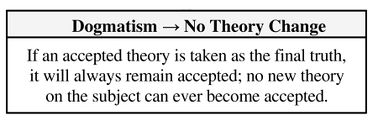Difference between revisions of "Changeability of the Scientific Mosaic"
Paul Patton (talk | contribs) |
|||
| Line 2: | Line 2: | ||
|Question=Under what circumstances does scientific change become impossible? | |Question=Under what circumstances does scientific change become impossible? | ||
|Topic Type=Descriptive | |Topic Type=Descriptive | ||
| − | |Description= | + | |Description=A theory of scientific change seeks to describe the conditions under which scientific change can occur. If change can occur within a given mosaic, the theory should set out to describe how such a change is possible and under which circumstances changes can and cannot happen. This is a crucial question that must be answered by any such theory. |
| − | |||
|Parent Topic=Mechanism of Scientific Change | |Parent Topic=Mechanism of Scientific Change | ||
|Authors List=Hakob Barseghyan, | |Authors List=Hakob Barseghyan, | ||
Revision as of 22:42, 6 October 2016
Under what circumstances does scientific change become impossible?
A theory of scientific change seeks to describe the conditions under which scientific change can occur. If change can occur within a given mosaic, the theory should set out to describe how such a change is possible and under which circumstances changes can and cannot happen. This is a crucial question that must be answered by any such theory.
In the scientonomic context, this question was first formulated by Hakob Barseghyan in 2015. The question is currently accepted as a legitimate topic for discussion by Scientonomy community.
In Scientonomy, the accepted answer to the question is:
- If an accepted theory is taken as the final truth, it will always remain accepted; no new theory on the subject can ever be accepted.
Contents
Scientonomic History
Acceptance Record
| Community | Accepted From | Acceptance Indicators | Still Accepted | Accepted Until | Rejection Indicators |
|---|---|---|---|---|---|
| Scientonomy | 1 January 2016 | This is when the first answer to the question was accepted, the Dogmatism No Theory Change theorem (Barseghyan-2015), indicating that the question is itself legitimate. | Yes |
All Theories
| Theory | Formulation | Formulated In |
|---|---|---|
| Dogmatism No Theory Change theorem (Barseghyan-2015) | If an accepted theory is taken as the final truth, it will always remain accepted; no new theory on the subject can ever be accepted. | 2015 |
If an answer to this question is missing, please click here to add it.
Accepted Theories
| Community | Theory | Accepted From | Accepted Until |
|---|---|---|---|
| Scientonomy | Dogmatism No Theory Change theorem (Barseghyan-2015) | 1 January 2016 |
Suggested Modifications
Current View
In Scientonomy, the accepted answer to the question is Dogmatism No Theory Change theorem (Barseghyan-2015).
Dogmatism No Theory Change theorem (Barseghyan-2015) states: "If an accepted theory is taken as the final truth, it will always remain accepted; no new theory on the subject can ever be accepted."
No theory acceptance may take place in a genuinely dogmatic community. "Namely," as is noted in Barseghyan (2015), Barseghyan notes, when introducing the theory rejection theorem in Barseghyan (2015), "theory change is impossible in cases where a currently accepted theory is considered as revealing the final and absolute truth".1p. 165
Related Topics
This question is a subquestion of Mechanism of Scientific Change.
This topic is also related to the following topic(s):
References
- ^ Barseghyan, Hakob. (2015) The Laws of Scientific Change. Springer.
